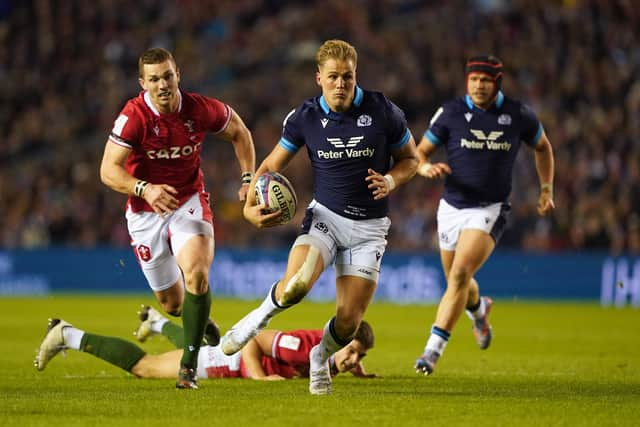Why Scotland’s Six Nations could rest on selection consistency - the lessons to be learned from 1996
The head coach played stand-off in that team which followed up wins over Ireland away and France at home with a third consecutive victory, against Wales in Cardiff. That set up a grand slam chance against England at Murrayfield but hopes of a repeat of 1990 were quashed when the visitors under the redoubtable influence of Dean Richards strangled the life out of a tryless match to win 18-9. With Scotland having completed their fixtures, England would go on to pip them for the Five Nations title on points difference a fortnight later by beating Ireland at Twickenham.
It had been a valiant effort by a Scottish team which had lost some big hitters after the 1995 Rugby World Cup. Gavin Hastings, most famously, had bowed out after South Africa but the celebrated skipper was not the only one. Kenny Milne and Iain Morrison joined the full-back in making their final international appearances in the quarter-final loss to the All Blacks. Townsend missed the ’95 World Cup through injury but returned for the 1996 Five Nations - the first since professionalism - alongside young tyros such as Rowen Shepherd, Michael Dods and Kevin McKenzie, with Rob Wainwright taking over the captaincy from Hastings.
Advertisement
Hide AdAdvertisement
Hide Ad“That team was full of confidence because there were a few big retirements in ’95, with Gavin in particular,” recalled Townsend. “We did go out and play rugby. In Dublin we played rugby and the France game was a standout game, we moved the ball, created problems. It’s ancient history, but those would be the similarities.”


The other striking similarity involves selection. Richie Dixon, the head coach, picked the same team for all four matches in 1996, building momentum in the way Jim Telfer and Ian McGeechan did in 1990 when they won the Championship with the same starting XV throughout. Townsend hasn’t quite gone that far this year but to face Wales in Edinburgh the Scotland coach picked 14 of the 15 players who had won at Twickenham in round one, the only change being the return of Zander Fagerson at tighthead in place of WP Nel.
Such consistency of selection is uncommon in the modern game and certainly un usual for Townsend who has never been afraid to tinker during his near six years in charge, changing his entire front row after beating England last season. While it’s hard to quantify how significant it was in the 35-7 win at Murrayfield on Saturday, it’s certainly worth noting how long it has taken Scotland to emulate the 1996 team in terms of winning their opening two games. By any measure, 27 years is a remarkable length of time and doesn’t reflect well on Scotland. But, as Townsend noted, that can now be consigned to history as his team gear up for their third match, against France in Paris on Sunday. The coach will surely be tempted to keep faith with the match-day squad that has served him so well against England and Wales. Fitness will be a factor, of course. Scotland have been fortunate with injuries so far, again unusual in the modern game. But there were a couple of retirals against Wales. Stuart Hogg, such an important player for Scotland for the last decade, lasted only 13 minutes before going off for a head injury assessment which he failed. The full-back will now go through return-to-play protocols to determine his availability to face France. Luke Crosbie also departed prematurely, early in the second half, due to a shoulder “stinger” but Townsend seemed confident it was nothing too serious. Blair Kinghorn proved to be a more than able replacement for Hogg at the weekend, and Jack Dempsey, who scored a try for Glasgow in Friday’s win over Ulster, or Hamish Watson, who played 60 minutes for Edinburgh in Saturday’s defeat at Scarlets, could come into the back row should Crosbie not make it. But you suspect Townsend would be keen to give this team more time together in the saddle.
“There’s an intent about how we play,” the coach said after the Wales win. “There’s not the total accuracy yet. It was there in the second half and that’s what we’ve got to keep fine-tuning, demanding of each other. But there is an intent to put teams under pressure, both sides of the ball.”
Victories breed belief and you could see it coursing through the Scottish players as Finn Russell led the rampage against Wales in the second half. Bigger tests lie ahead, of course, with France and Ireland up next but if Scotland can emerge from Paris unscathed then this team would be on the brink of something very special indeed.
Comments
Want to join the conversation? Please or to comment on this article.
